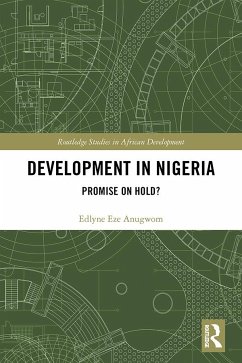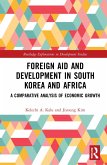This book unravels the trajectories and dilemmas of development in Nigeria since its independence in 1960. Despite enormous human and material resources, development progress in Nigeria has not met expectations. By delving into the various factors that have influenced development efforts and initiatives, Development in Nigeria: Promise on Hold? aims to draw out lessons to help the country to achieve its potential. In many ways Nigeria typifies the African puzzle of near-misses, a never-ending drive towards development with enormous promise but no real practical output. As in many states within Africa, these failures can be traced to structural inadequacies and the perennial weakness of public institutions. Problems which collectively undermine sustainable development and growth include political corruption, ethnicity, failure of public institutions, distributional injustice, fiscal centralism in a purported federal state, faulty democratic traditions, malevolent elite class, religious and social conflicts, among others. By taking a comprehensive panoramic overview of the country's historical experience as both a military dictatorship and democracy, Edlyne Eze Anugwom presents a nuanced, comprehensive and contemporary interrogation of the ever-dynamic forces and factors in Nigeria's development project. This book's incisive examination of Nigeria's development aspirations over time will be of interest to students of Development and African Studies, as well as to practitioners and multilateral agencies involved in development planning and intervention in Nigeria who are looking for strategies for overcoming the challenges facing the country.
Hinweis: Dieser Artikel kann nur an eine deutsche Lieferadresse ausgeliefert werden.
Hinweis: Dieser Artikel kann nur an eine deutsche Lieferadresse ausgeliefert werden.
"Academic critique of Nigeria's anemic political and economic development has been its own cottage industry since the 1980s. Given Nigeria's large population and substantial natural resources, the incontrovertible assumption has always been that the country should be much better developed. In this volume, Anugwom lays out all of the most common explanations for Nigeria's perennial underdevelopment, dedicating chapters to corruption, ethnic nationalism, religious conflict, oil dependency, and problems with Nigeria's federal structure, among other topics. The book is mostly a synthesis of the various discourses on these subjects in political and social sciences and their application to Nigeria's circumstances of development. As such, there is little in here that will not already be familiar to anyone with a background in Nigerian political economy. However, the elaboration of the themes is cogent, concise, and comprehensive, making it an excellent introductory text for non-specialists and a valuable reference work that brings together many different approaches to Nigerian development in a single volume. A journey through this book leaves the reader with a stronger understanding of the complexity of Nigeria's development dilemma, for which there is no simple panacea." --M. M. Heaton, Virginia Tech








